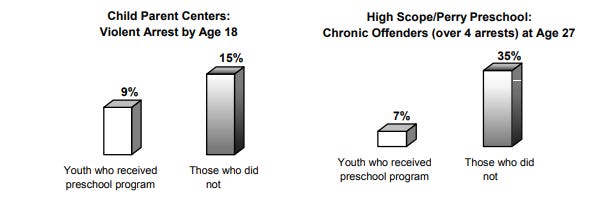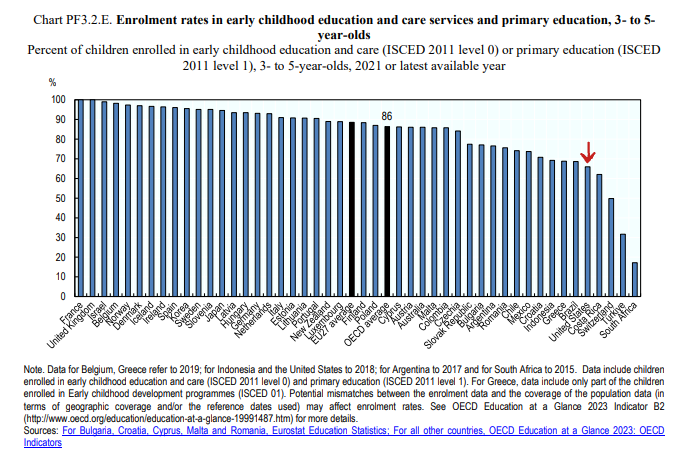The Incredible Value of Preschool
As I dropped my four-year-old daughter off for her first day of school, the beginning of Pre-K, I experienced the usual emotions that parents feel as they reach this milestone of their child being away from home for the first time. But there was another thought on my mind the whole drive home:
I was grateful she had this opportunity.
She didn’t attend preschool at the age of three because we couldn’t afford it. We searched, researched, and considered schools far from us, which would have been challenging for a one-car family, but in the end, we couldn’t find a way to make it work. Instead, we chose to find activities she could do to socialize with other children. A dance class and a swim class, combined, were a small fraction of the cost of school.
Why is this year different? Because we live in a city that provides universal Pre-K. There is no cost for her to attend school, learn, develop independence, and acquire the skills she will need for Kindergarten and beyond.
If Chicago didn’t have universal Pre-K, and the costs were similar to those of preschool, we would likely have been forced to move because having our daughter miss out on school would put her at a disadvantage. That’s because the advantages of Pre-K extend beyond improved readiness for Kindergarten, which is already a significant benefit.
Children who attend quality Pre-K have:
Higher math and reading skills throughout school
Better memory, problem-solving, and attention
Higher rates of graduation and attending college
Better social skills and sense of community
Higher salaries and are less likely to commit crimes as adults
Multiple studies have found that children who do not attend any preschool are more likely to be arrested for committing a violent crime by the time they become an adult than children who do attend preschool.
Large national studies show that at-risk kids who attended quality child care programs had no more behavior problems at age eight than did children of college-educated moms. But those at-risk kids who received poor quality care had significantly more problem behaviors.
This is important because research consistently shows that children who exhibit problem behaviors in the early grades are at far greater risk than other children of becoming teen delinquents and adult criminals.
-Economic Opportunity Institute
Despite all of this research and the continued proven success of Pre-K and preschool, most states, including Illinois, do not have universal Pre-K, and even fewer have universal preschool.
According to Census.gov, in 2019, 49% of children aged 3-6 were not enrolled in preschool or Pre-K. In 2021, that had increased to 58%, due to the pandemic. That is a tragically high number of children to miss out on fundamental education that can improve the trajectory of their entire lives.
The National Institute for Early Education Research found that in 2023, 35% of 4-year-olds were enrolled in state-funded Pre-K, and just 7% of 3-year-olds were enrolled in state-funded preschool. Both of those were record highs for the US.
America continues to underestimate the importance of education, not just for the individual, but for society. Better access to education reduces unemployment, homelessness, and crime, while increasing economic prosperity. The entire country benefits from well-funded, quality education, especially at the preschool and Pre-K levels, even for people who do not have children.
However, instead of acknowledging this and improving our nation’s education system, it is continually attacked and defunded, including the most recent political attempts to shut down the Department of Education, which provides essential research and resources to schools across the country.
Other countries understand this. The Organisation for Economic Cooperation and Development has 38 member countries. Here is how the United States ranks among those nations:
26th in Pre-K participation for 4-year-olds
24th in preschool participation for 3-year-olds
22nd in age when children begin early childhood education programs
21st in total investment in early childhood education as a percentage of the country’s wealth
Japan is known for its near 100% enrollment rate of 4-year-olds. Japan also routinely ranks in the top 5 for the three subjects tracked in OECD’s student assessment called PISA: math, science, and reading. The UK has a 97% enrollment rate for 4-year-olds. Mexico has an 81% rate. Then there are nations like France, Norway, and Italy, which even have a 90% enrollment rate for 3-year-olds in preschool.
America needs to do better. And not just for preschool, but at all levels of education, which is something the Department of Education was created to assist with. The article linked at the bottom of this page discusses the role of the Department of Education and how two states, Louisiana and Alabama, used funds and research from the Department of Education to create substantial improvements in the quality of education their schools were delivering.
Hopefully, America will finally realize the importance of education, particularly at a young age. Not only am I thankful to have universal Pre-K for my daughter, but I am also thankful that school has been such a fun experience for her that she is excited to go every day and has even said she wants to go to school on weekends. That is education that works, and every parent should have that opportunity for their children.
America's Education
President Trump signed an executive order to dismantle the Department of Education. His reasoning has ranged from claiming America ranks dead last in education, that the Department of Education is indoctrinating children with liberal propaganda, that control of education should be returned to the states, and that America spends the most on education in …





